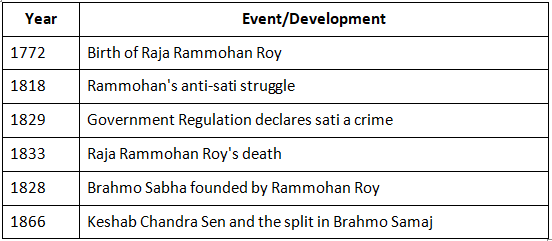Cheat Sheet: A General Survey of Socio- Cultural Reform Movements | History for UPSC CSE PDF Download
Introduction
Socio-cultural reform movements in India played a pivotal role in reshaping societal norms and challenging traditional practices. Led by visionary leaders, these movements aimed at bringing about positive changes in various aspects of Indian society. The chronology below presents a structured overview of significant socio-cultural reform movements and their leaders, highlighting their contributions and impact.
Raja Rammohan Roy and Brahmo Samaj

Key Contributions:
- Advocacy for monotheism and rejection of idol worship.
- Opposition to caste system and meaningless rituals.
- Efforts against sati, polygamy, and for women's rights.
- Establishment of educational institutions.
Debendranath Tagore and Brahmo Samaj

Key Contributions:
- Systematic study of India’s past with a rational outlook.
- Opposition to Christian missionaries and their criticism of Hinduism.
Prarthana Samaj

Key Contributions:
- Focus on liberal ideas, breaking down caste barriers.
- Advocacy for women’s education, widow remarriage, and social reform.
Table 4: Young Bengal Movement
| Year | Event/Development |
|---|---|
| 1826 | Henry Vivian Derozio teaches at Hindu College |
| 1830s | Young Bengal Movement gains momentum |
Key Contributions:
- Advocacy for public education, freedom of the press, and social reforms.
- Limited success due to prevailing social conditions.
Ishwar Chandra Vidyasagar

Key Contributions:
- Legalization of widow remarriage.
- Advocacy against child marriage and polygamy.
- Promotion of women's education.
Jyotiba Phule and Satyashodhak Samaj

Key Contributions:
- Powerful movement against upper-caste domination.
- Social service and spread of education among lower castes.
Ramakrishna Movement and Swami Vivekananda

Key Contributions:
- Spiritual and humanitarian work.
- Advocacy for the fundamental oneness of religions.
Conclusion
Socio-cultural reform movements in India, led by visionary leaders, played a crucial role in challenging outdated traditions and fostering positive changes. Despite some limitations, these movements contributed significantly to the modernization and social upliftment of Indian society. The emphasis on education, gender equality, and the rejection of discriminatory practices have left a lasting impact on the cultural landscape of India. As the nation continues to evolve, the legacy of these reformers remains an integral part of India's socio-cultural identity.
|
216 videos|855 docs|219 tests
|
FAQs on Cheat Sheet: A General Survey of Socio- Cultural Reform Movements - History for UPSC CSE
| 1. What are socio-cultural reform movements? |  |
| 2. What is the significance of socio-cultural reform movements? |  |
| 3. Can you provide examples of socio-cultural reform movements? |  |
| 4. How do socio-cultural reform movements bring about change? |  |
| 5. What are the challenges faced by socio-cultural reform movements? |  |
















